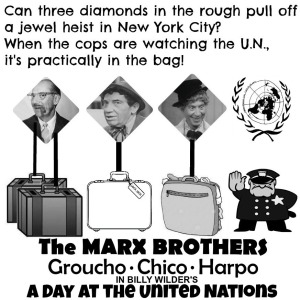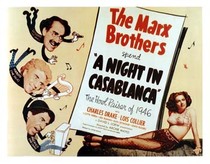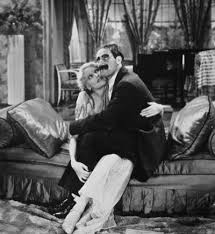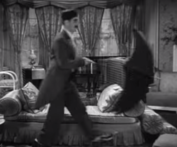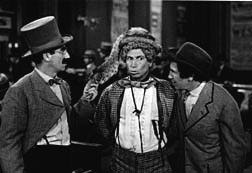
The following is my entry in the “31 Days of Oscar” Blogathon, being held from Feb. 2 through 24, and sponsored by the blogs Paula’s Cinema Club, Outspoken & Freckled, and Once Upon a Screen.
Each week’s blogs have a different Oscar-related theme. I am contributing to the “Oscar Snubs” week being held Feb. 9 and 10. (Why am I contributing my blog five days before the deadline? Because that’s how I roll, baby!)
In any case, click on the blogathon’s poster (above) to read some interesting insights into various aspects of the history of the Academy Awards!

The Little Tramp cleans up after a very ambitious Oscar number.
This blog is about three very deserving movie-comedy idols, all of whom were awarded Oscars. At this point, you’re probably thinking, How does such a blog fit in under the heading “Oscar Snubs”?

The answer is simple. Buster Keaton, Charles Chaplin, and Groucho Marx all received “Honorary Oscars” at the twilight of their lives. The Motion Picture Academy’s thinly veiled secret is that such Oscars are awarded only after Academy members suffer pangs of guilt over not properly honoring these comedy giants in the heyday of their careers.
So this is my way of righting the Movie Comedy Universe. The slate is thus wiped clean, and this trio of classic comedians are justly awarded Oscars for some of their best movie work.
(Before I begin, a full disclosure. Chaplin actually did win an Oscar of sorts, at the very first Oscar presentation, but it was the early equivalent of a Honorary Oscar. He was given a Special Oscar “for versatility and genius in writing, acting, directing and producing The Circus.” However [and sadly], this took Chaplin out of the running for acting, writing, directing, and Best Picture categories for which he had initially been nominated. Here’s your consolation prize, Tramp, now get off the stage.
(Also, I would gladly have included Stan Laurel in this list [He received an Honorary Oscar in 1961], had Laurel & Hardy’s The Music Box not won an Oscar for Best Short Subject of 1932. You got by on a pass on that one, Academy!)
*

Buster Keaton: Awarded an Honorary Oscar in 1960 “for his unique talents which brought immortal comedies to the screen.”
The movie for which he should have won an Oscar: The General (1926).
(Somebody is bound to p*** on my parade about this one, so let me clarify some things. The first Oscar ceremony, held in 1929, was purposed to honor the best films of 1927 and 1928. According to Wikipedia, The General’s U.S. release date was Dec. 31, 1926 — which, of course, means that it technically doesn’t qualify as a 1927 film, although it was released in several other regions in ‘27. But in my just Movie Comedy Universe, are you really not going to cut 24 hours’ slack for a movie that has been widely regarded as one of the best of all time? I thought not.)

In this movie (based on a real-life Civil War story), Keaton plays Johnnie Gray, a Georgia train engineer who wants to enlist in the war as badly as anyone. But the local recruiter refuses to enlist Johnnie because he is needed in the South as an engineer. However, nobody imparts this information to Johnnie or his peers, leading Johnnie’s girlfriend Annabelle to snub him because she thinks he’s a coward. Later, when Annabelle is kidnapped by Northern rebels, Johnnie takes it upon himself to rescue her, using his train The General as a one-man sabotage operation against the North.
This synopsis does not begin to do justice to one of silent film’s most powerful movies. Keaton told his crew that he wanted the movie to be “so authentic it hurts,” and as a result, this marvelously photographed film looks like a Civil War photo come to life. The movie’s plotting is wonderfully symmetrical, as Johnnie becomes a hero by pulling the same tricks on the Northern soldiers as they had previously pulled on him. Most of all, Keaton spared no personal effort on this movie, constantly jumping off, on, over, and on top of a moving train and making it look as effortless as riding a bike.

Sadly, by the time the first Oscar presentation took place, Keaton was a movie marionette whose strings were being pulled by M-G-M’s Louis B. Mayer — who, by no small coincidence, had founded the Motion Picture Academy and had created the Academy Award basically to curb some of Hollywood’s most swelled heads by giving them the tributes they felt they deserved. There is no way that Mayer would have recognized any of Keaton’s pre-M-G-M work with an award. It took several decades of re-viewing for critics and movie buffs to realize what a classic The General was and is.
The next time you see some movie star being aided in his myth-making by stuntmen and CGI, remember that one comedian previously did eye-popping stunts on his own, long before anyone even conceived of a computer in which special effects could be created.
*

Charles Chaplin: Awarded an Honorary Award in 1972 “for the incalculable effect he has had in making motion pictures the art form of this century.”
The movie for which he should have won an Oscar: City Lights (1931).
Chaplin conceived of City Lights in late 1929, just as talkie fever had engulfed Hollywood. Chaplin considered making his new movie as a talkie. But in the end, he opted for the Tramp’s universal silent appeal, realizing that once he talked on screen, he would be “like every other comedian.” So Chaplin bucked the tide and went ahead with the movie as a silent picture.
In this movie, Chaplin’s Tramp falls in love with a blind flower girl. (She was played by Virginia Cherrill, who by Chaplin’s account could not convey the simplest actions plausibly and required take after take of each scene. But in the end, Chaplin realized that only Cherrill could suitably convey the flower girl’s charm.)
The Tramp tries various odd jobs to earn money for an operation to restore the girl’s eyesight (and these “jobs” are some of the movie’s highlights). The Tramp also ends up making friends with a rich drunk (Harry Myers) who adores the Tramp while he’s in his cups but has no memory of him when he’s sober.
All of this results in some wonderful comedy, mostly because Chaplin does indeed use sound, but uses it mostly to comment on the character’s actions (as when Charlie swallows a whistle and it makes noises at inopportune moments). And it certainly results in some risible drama, particularly in the movie’s final scene, where Chaplin and Cherrill’s minimalist acting has left generations of moviegoers either stunned or teary-eyed at movie’s end.

As with The General, City Lights is an example of being seen and re-seen for generations to rightly earn its place in the film pantheon. Too bad the Academy couldn’t see a good thing when it was right on movie screens across the country.
*

Groucho Marx: Awarded an Honorary Oscar in 1974 “in recognition of his brilliant creativity and for the unequaled achievements of the Marx Brothers in the art of motion picture comedy.”
The movie for which he should have won an Oscar: A Day at the Races (1937).
My Oscar choice is sure to rankle many Marx Brothers buffs. The popular choice would probably be Duck Soup (1933), which is certainly my own all-time favorite Marx Brothers movie. But actors’ Oscars are meant to recognize individual acting achievement. And I contend that no single Marx Brother made as much of an impact on a Marx Brothers movie as Groucho did in A Day at the Races.
The movie’s story is that a sanitarium is about to be torn down and replaced with a race track, thanks to the sanitarium’s unscrupulous landowner. But the sanitarium’s richest patient (Margaret Dumont) decides to help save the place by bringing in her most cherished doctor: Hugo Z. Hackenbush (Groucho) who, unbeknownst to the patient but soon discovered by others, has earned his medical title by serving as a horse doctor.
Groucho’s most memorable Marx Bros. outings display him as a pre-supposed man of society, while Groucho outwardly displays himself as a phony to citizens who are either too dumb or too spineless to show that this emperor wears no clothes. (Think of explorer Geoffrey Spaulding in Animal Crackers, who faints when he finds a caterpillar on his sleeve; or Freedonia leader Rufus T. Firefly, who sings in his inaugural address, “If you think this country’s bad off now, just wait ‘til I get through with it.”)

And when it comes to comedy (we’ll politely ignore this movie’s gaseous musical interludes), you can barely think of A Day at the Races without Groucho. Other than the superb charades scene involving only Harpo and Chico, every major comedy moment in this movie involves Groucho. Either he’s putting one over on the sanitarium’s sleazy administrators, skittering from one woman to another during a society dance, or demonstrating (with his brothers) the paramount importance of washing one’s hands in lieu of performing an actual operation.
In my humble opinion, Races was Groucho’s finest hour with the Marx Brothers; with or without his brothers, he never operated again at such full steam in a movie. So why wasn’t he nominated for an Oscar?

What?? Not King Louis again!
This is quite a reach, I’ll admit, but I’d like to think that the smoking gun again lay at the hand of, yes, Louis B. Mayer. Ironically, Races was an M-G-M production, so you’d think that Mayer would have been supporting such an Oscar nom. But sadly, Mayer was no friend of Groucho’s after having been snubbed by him. One day, Mayer and Groucho happened to pass each other in an M-G-M corridor, and Mayer, trying to make friendly small talk, asked, “Well, how’s the picture going, Groucho?”
Groucho, beholden to M-G-M producer Irving Thalberg and no one else, curtly replied to one of Hollywood’s biggest movers-and-shakers, “I don’t think that’s any of your business!” and moved on down the hall.
If there had ever been even the slightest possibility that Groucho could have been nominated for an Oscar, that exchange certainly put the kibosh to it. Happily, we still have A Day at the Races and many other Marx Brothers movies available for the purpose of anti-establishment hilarity.
*
So there you have it. Three comedy greats who were basically awarded a “guilt Oscar” rather than a worthy award for any of their great work. Is it any wonder that Woody Allen snubbed the Oscars when Annie Hall swept them in 1977?

“Look! There are those silly people going to the Oscar ceremony again!”





